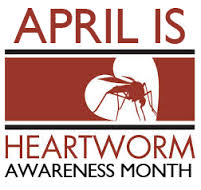Heartworm Disease in Springfield Pets
In order to help promote awareness to Heartworm disease, here are some interesting facts:
- It only takes one bite from an infected mosquito to spread heartworm disease.
- Heartworm disease is a serious and potentially fatal disease in pets in the United States and many other parts of the world. It is caused by foot-long worms (heartworms) that live in the heart, lungs and associated blood vessels of affected pets, causing severe lung disease, heart failure and damage to other organs in the body.
- Heartworm disease affects dogs, cats and ferrets, but heartworms also live in other mammal species, including wolves, coyotes, foxes, sea lions and—in rare instances—humans. Because wild species such as foxes and coyotes live in proximity to many urban areas, they are considered important carriers of the disease.
- More than a million pets in the United States have heartworm disease.
- Heartworm disease has been diagnosed in all 50 states.
- Both indoor and outdoor pets are at risk of developing heartworm disease because infected mosquitoes can come inside.
- Dogs can harbor several hundred worms in their body whereas cats typically just have one to three worms and many cats affected by heartworms have no adult worms.
- There is no approved treatment for heartworm disease in cats, but supportive care can help manage complications.
- Once mature, heartworms can live up to 7 years in a dog.
- It takes at least 6 months for a dog to test positive after it has been infected with heartworms. This is why annual testing is recommended for earliest detection of the disease.
- Once tested positive, a dog must be kept in strict confinement and have restricted activity for a period of 5-6 months during and after treatment of heartworm disease to try and decrease potential complications associated with eliminating adult heartworms.
- Prevention is safe, effective, and cost effective.
- You can buy 7 years of heartworm prevention for less than the cost of treating your dog one time for heartworms.
- To date, the national average is one out of every 73 dogs will test positive for heartworm disease.
- One out of 56 dogs tested positive for heartworm disease in Greene County, MO thus far for 2016.
- Deerfield Veterinary Hospital in Springfield Missouri has diagnosed 7 heartworm positive dogs since January 2015, however we have a higher compliance rate of dogs receiving monthly preventative than compared to more rural areas. More rural areas can have as many as one heartworm positive dog diagnosed each week.
- Preventatives work by killing the microfilaria and early larval stages of heartworms that your pet has picked up the previous month. If you stop giving it in the fall or early winter, the parasites might remain and cause infection.
- Adult dogs over 7 months of age and previously not on a preventive need to be tested prior to starting heartworm prevention.
- Annual testing is necessary, even when dogs are on heartworm prevention year-round, to ensure that the prevention program is working. Heartworm medications are highly effective, but dogs can still become infected. If you miss just one dose of a monthly medication-or give it late-it can leave your dog unprotected. Even if you give medication as recommended, your dog may spit out or vomit a heartworm pill-or rub off topical medication. Heartworm preventatives are highly effective, but not 100 percent effective. If you don’t get your dog tested , you won’t know your dog needs treatment.
- There are three different types of preventative available for use to protect your pet: once-a-month chewable, once-a-month topical, or twice-a-year injection.
- There is only one drug approved by the FDA for treatment of heartworm disease called melarsomine and it is administered by injection only by a veterinarian. Additional medications may be prescribed by your veterinarian to help improve the chances of treatment success and reduce the incidence of side effects associated with the death of adult heartworms.
As the saying goes, an ounce of prevention is worth more than a pound of cure. Remember to “Think 12.” Test for heartworm disease every 12 months and give heartworm preventative 12 months a year. Deerfield Veterinary Hospital offers a variety of preventatives to help protect your pet. Let us help you decide which preventative is best for your pet, lifestyle, and budget.
The information used for this blog was obtained from the American Heartworm Society website, Companion Animal Parasite Council website, and medical records from Deerfield Veterinary Hospital. For more information about heartworm disease, please visit the American Heartworm Society’s website at https://www.heartwormsociety.org/ and the Companion Animal Parasite Council’s website at http://www.capcvet.org/.




